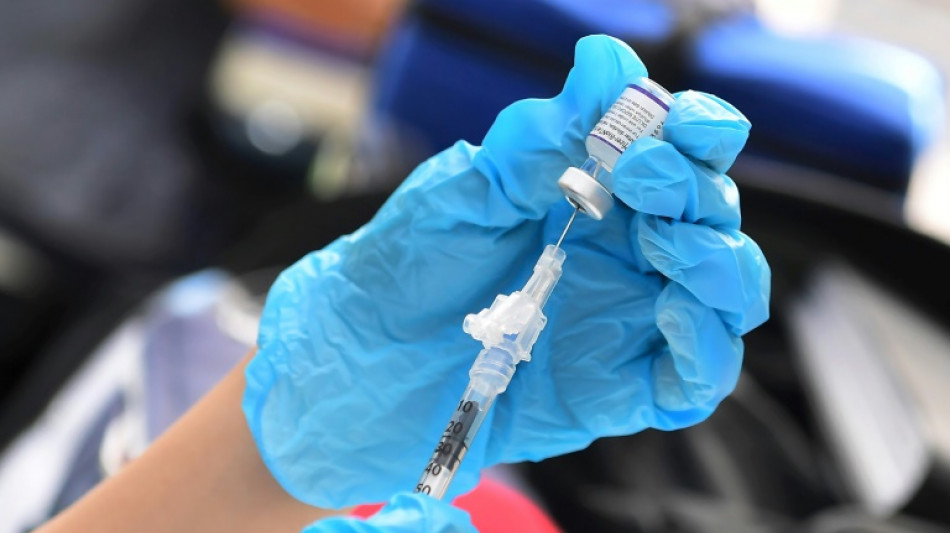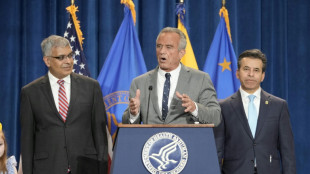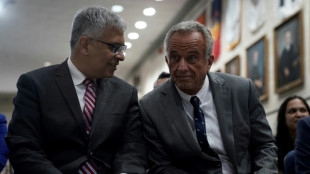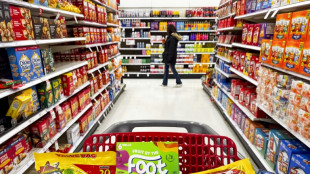
-
 Indian army says new exchange of gunfire with Pakistan
Indian army says new exchange of gunfire with Pakistan
-
Epstein accuser Virginia Giuffre takes own life in Australia: family

-
 Hundreds of buildings damaged, dozens injured in 6.3 Ecuador quake
Hundreds of buildings damaged, dozens injured in 6.3 Ecuador quake
-
India and Pakistan's Kashmir fallout hits economy too

-
 Francis's funeral to be grand farewell to 'pope of the poor'
Francis's funeral to be grand farewell to 'pope of the poor'
-
Pogacar faces defiant Evenepoel at Liege-Bastogne-Liege

-
 Chelsea eye great escape against Barcelona in Women's Champions League
Chelsea eye great escape against Barcelona in Women's Champions League
-
Iran, US to hold new round of high-level nuclear talks

-
 'Energy and effort' pay off for Reds as Blues' woes continue
'Energy and effort' pay off for Reds as Blues' woes continue
-
Albatross and closing birdie lift China's Liu to LPGA Chevron lead

-
 On the horizon? Wave of momentum for high seas treaty
On the horizon? Wave of momentum for high seas treaty
-
Developing countries should fast-track US trade deals: World Bank president

-
 Grizzlies' Morant 'doubtful' for must-win game 4 v Thunder
Grizzlies' Morant 'doubtful' for must-win game 4 v Thunder
-
Trump in Rome for pope funeral in first foreign trip of new term

-
 Trump says Russia-Ukraine deal 'very close' after new Kremlin talks
Trump says Russia-Ukraine deal 'very close' after new Kremlin talks
-
US rookies lead PGA pairs event with McIlroy and Lowry in hunt

-
 Trump tariff promises get a reality check
Trump tariff promises get a reality check
-
Warriors coach Kerr 'relatively optimistic' injured Butler will play game 3

-
 Postecoglou hopes 'Stonecutter's Credo' can inspire Spurs
Postecoglou hopes 'Stonecutter's Credo' can inspire Spurs
-
PSG lose unbeaten Ligue 1 record ahead of Arsenal showdown

-
 Venezuela accuses El Salvador president of 'human trafficking'
Venezuela accuses El Salvador president of 'human trafficking'
-
Own goal takes Sundowns to African final against Pyramids

-
 Scores of buildings damaged, 20 injured in Ecuador quake
Scores of buildings damaged, 20 injured in Ecuador quake
-
US stocks extend rally as market eyes busy calendar next week

-
 Pope's death triggers surge of disinformation he fought against
Pope's death triggers surge of disinformation he fought against
-
Rovanpera takes control of Rally Islas Canarias

-
 Zelensky insists Crimea is Ukrainian as US envoy meets Putin
Zelensky insists Crimea is Ukrainian as US envoy meets Putin
-
Patel and Mendis help Sunrisers beat Kings in Dhoni's 400th T20

-
 Copa del Rey ref statements 'unacceptable': Real Madrid after boycotting final build-up
Copa del Rey ref statements 'unacceptable': Real Madrid after boycotting final build-up
-
Insurance CEO's accused killer pleads not guilty to federal murder charges

-
 FBI arrests Wisconsin judge for shielding undocumented migrant
FBI arrests Wisconsin judge for shielding undocumented migrant
-
Brazil ex-president Collor de Mello jailed for corruption

-
 Zelensky insists Crimea 'belongs' to Ukraine as US envoy meets Putin
Zelensky insists Crimea 'belongs' to Ukraine as US envoy meets Putin
-
Real Madrid boycott Copa del Rey build-up over referee complaints

-
 Trinidad and Tobago votes for parliament, PM, with opposition in lead
Trinidad and Tobago votes for parliament, PM, with opposition in lead
-
IMF chief hails 'constructive' Spring Meetings held under tariff uncertainty

-
 Iran FM Araghchi in Oman ahead of nuclear talks with US
Iran FM Araghchi in Oman ahead of nuclear talks with US
-
Dozens of buildings destroyed, 20 injured in Ecuador quake

-
 Young Barca must 'enjoy' Real Madrid Copa final fight: Flick
Young Barca must 'enjoy' Real Madrid Copa final fight: Flick
-
Pakistan and India border closure separates families

-
 Brazil's Bolsonaro 'stable' after post-surgery setback
Brazil's Bolsonaro 'stable' after post-surgery setback
-
Catholics in secular Cuba hail Francis as 'bridge'

-
 US envoy Witkoff, Putin discuss 'possibility' of direct Russia-Ukraine talks
US envoy Witkoff, Putin discuss 'possibility' of direct Russia-Ukraine talks
-
Community seeks answers after French school knife killing

-
 German prosecutors seek jail terms in VW 'dieselgate' trial
German prosecutors seek jail terms in VW 'dieselgate' trial
-
Sabalenka makes winning start at Madrid Open

-
 EU, US should de-escalate and negotiate trade deal: IMF Europe director
EU, US should de-escalate and negotiate trade deal: IMF Europe director
-
Russia accuses Ukraine of killing general in car bombing

-
 Emery wants FA Cup glory and Champions League berth for Villa
Emery wants FA Cup glory and Champions League berth for Villa
-
Buildings destroyed, one injured in Ecuador quake


Covid's back: Here's what to know this fall and winter
As colder weather sets in, Covid rates are once more rising across the Northern Hemisphere, with several new variants on the scene.
Here's what you need to know.
- Covid versus seasonal nasties? -
The Covid pandemic extracted a terrible toll, with nearly seven million deaths worldwide.
But thanks to vaccines, prior immunity and better treatments, the virus is now far more manageable. In the United States, excess deaths -- the total number of people dying for any given cause -- has been normal since spring.
"If you asked me to choose between getting flu and Covid, I would pick Covid because each individual case of flu is more dangerous," said Ashish Jha, a former White House Covid coordinator and dean of public health at Brown University.
But while Covid is now less deadly to individuals, "it also seems to have higher rates of long term complications."
Covid is also less seasonal than the flu, more contagious, and over the last three US winters peaked from December to January, while flu peaks later.
Amesh Adalja, an infectious disease specialist at Johns Hopkins Center for Health Security, placed Covid "on par" with flu and RSV, but stressed it was more severe than the common cold.
- To boost or not to boost? -
Pfizer, Moderna and Novavax have developed new vaccines that more closely target current variants, all offshoots of Omicron which became dominant in late 2021.
There is broad consensus that annual boosters will benefit the most vulnerable. But whether they bring added value to everyone is debated.
Nearly everyone has already been infected, studies show. And prior infections combined with vaccines have trained immune systems to stop severe outcomes even when they can't ward off infection.
One-size-fits-all recommendations no longer make sense, and could decrease trust in public health, said Monica Gandhi, author of "Endemic: A Post-Pandemic Playbook."
For example, the mRNA vaccines of Pfizer and Moderna carry small risks of heart inflammation in younger men.
European nations advise annual shots only for higher risk groups, but some experts don't see downsides in wider recommendations.
"People at low risk still derive benefit from boosters," said Ziyad Al-Aly, an epidemiologist at Washington University in St. Louis. The United States recommends that nearly everyone get annual Covid shots.
- Are masks still useful? -
Experts diverge on this subject, one of the most controversial of the pandemic.
A review of clinical trial data by the respected nonprofit Cochrane on whether promoting mask-wearing helped slow respiratory viruses found inconclusive results.
Whether broad mandates have a significant effect, therefore, hasn't been proven.
What researchers do know -- thanks to lab experiments -- is that well-fitted, high-caliber masks such as N-95s protect individuals.
"Individuals can therefore choose to wear well-fitted and filtered masks indoors to provide personal protection from respiratory pathogens," said Gandhi, a professor at the University of California, San Francisco -- though she believes in vaccines to prevent severe disease, including among the high-risk.
- Test, or go to work? -
Experts agree that it makes sense for people at risk -- the elderly and those with conditions such as cancer, obesity and diabetes -- to test when they have symptoms.
That's because these groups "would benefit from antiviral therapy within the five-day window," said Adaja.
The most prominent treatment is Paxlovid, which has been shown to reduce the risk of severe disease and death among high-risk people.
Some health systems have decided testing at-risk people is all that's needed.
"Most people no longer need to take a coronavirus test. To prevent the spread of infection, you should try to stay at home if you're unwell," says the UK's National Health System.
- What about long Covid? -
Research around long Covid -- symptoms that linger for weeks or months -- remains nebulous and hampered by a lack of standardized definitions for a condition that has multiple causes, said Adalja.
Al-Aly estimates prevalence at between 4-7 percent, or 65 million people worldwide.
"Unfortunately, we have not made progress on treating long Covid. This should be an urgent priority for research," he said.
It does appear that prior vaccination reduces the risk of long Covid, and that the condition is correlated with severity of infection.
The US government has funded several trials into the condition, with one recent study finding a diabetes drug called metformin reduced the risk of ongoing symptoms by 40 percent.
Jha said he was hopeful of more data on treatments in the coming months.
O.Johnson--AMWN


